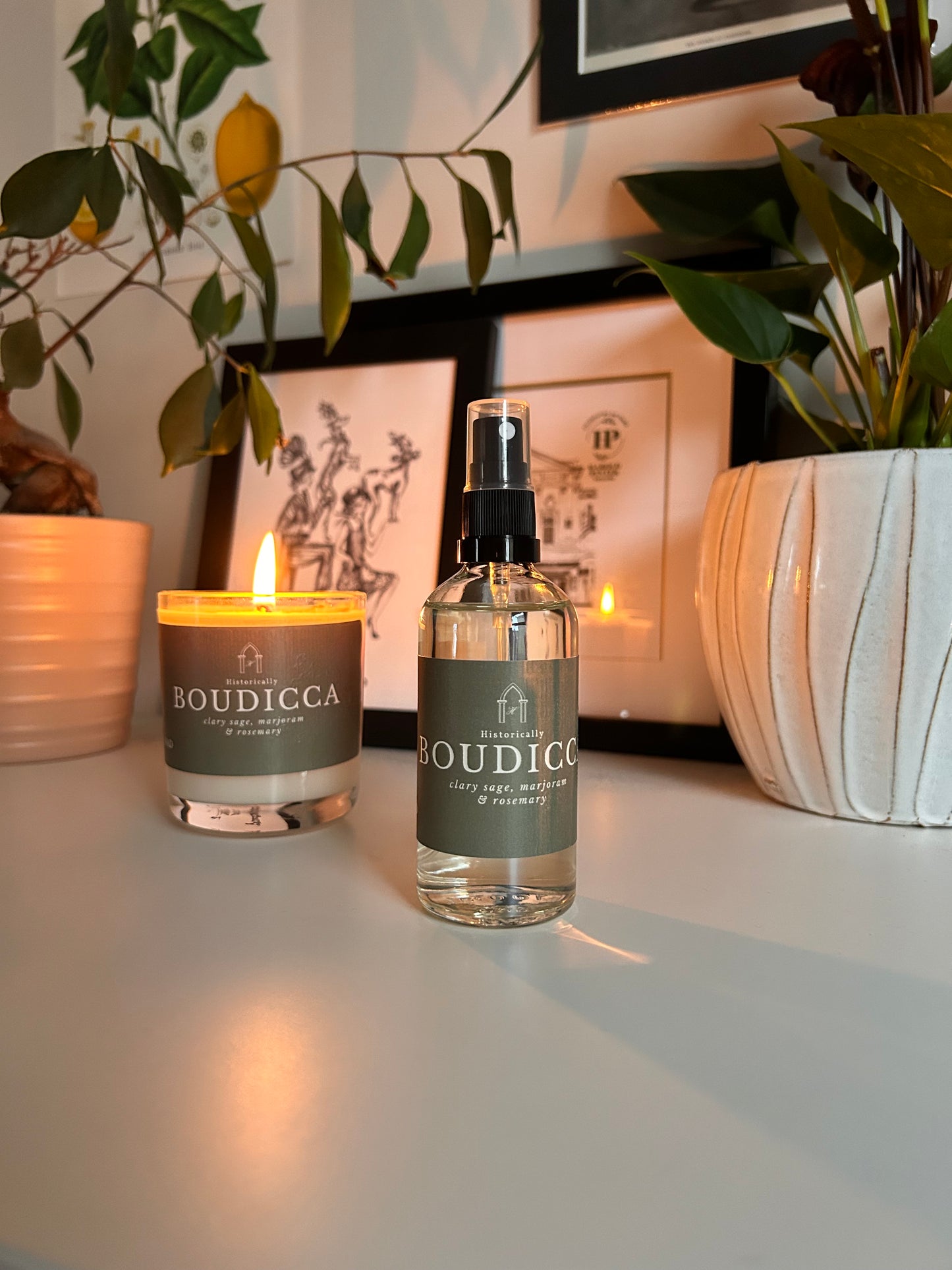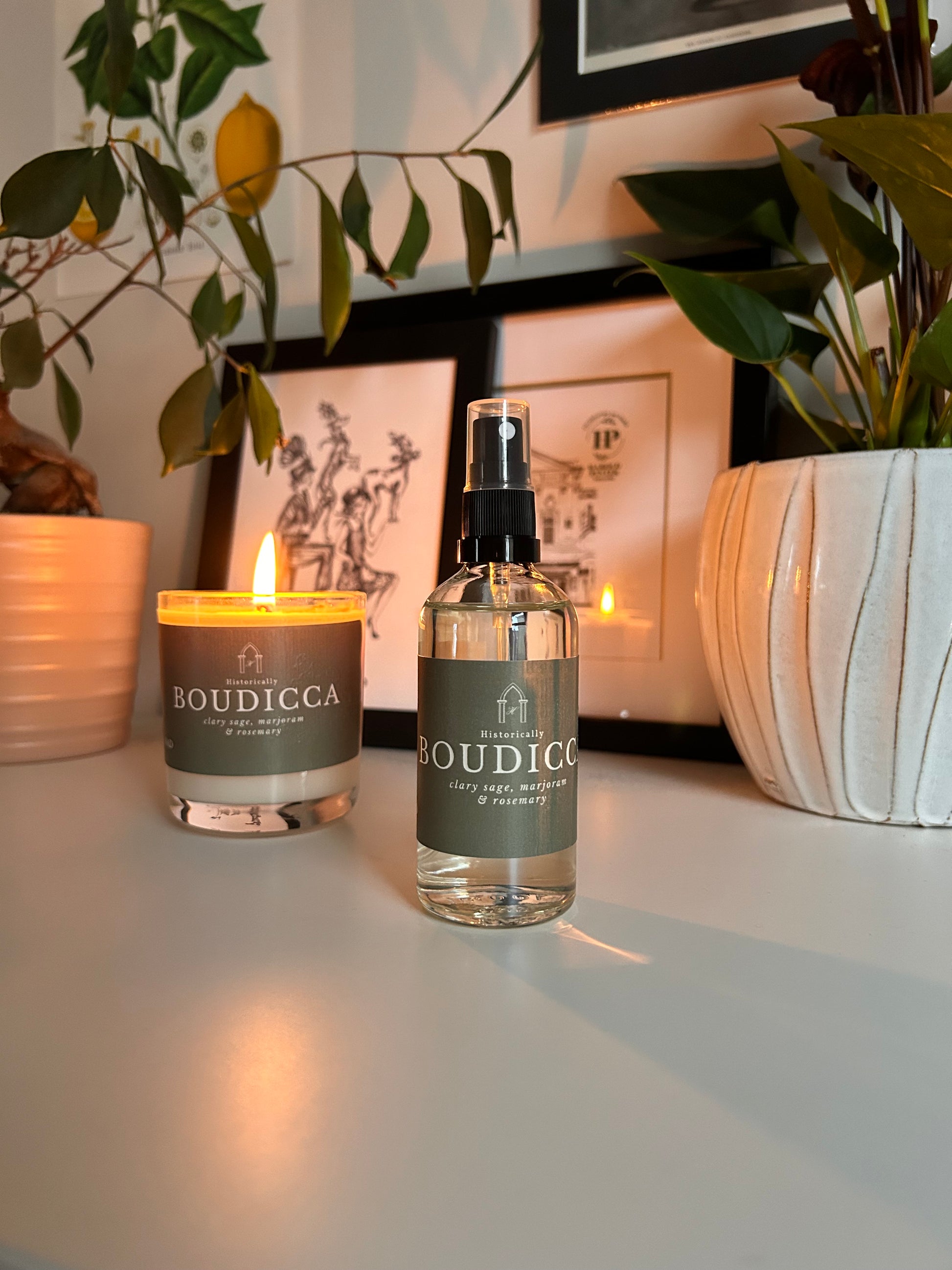Historically
Boudicca Room Spray
Boudicca Room Spray
Couldn't load pickup availability
Boudicca's Celtic Valour.
Channel the indomitable spirit of Boudicca, the revered warrior queen, with a candle that harnesses the potent aromas of clary sage, marjoram, and rosemary. Each herb, robust and earthy, reflects the resilience and tactical brilliance of this iconic leader of ancient Briton. Clary sage brings a clean, calming presence, marjoram adds a warm, spicy undertone, and rosemary, evergreen and invigorating, embodies Boudica's enduring legacy. Together, these scents craft a bold, aromatic tribute to her fearless campaigns against Roman conquest, igniting a sense of empowerment and ancient fortitude in your space.
100ml Room Spray perfect for an immediate history fix.
Please note Clary Sage should not to be used in proximity of pregnant women before their due date as it can induce early labour.
Share
Scent Notes
Scent Notes
Clary sage, marjoram & rosemary
Delivery & Returns
Delivery & Returns
Dispatch times
Our candles are made to order and most will take between 1-7 business days to dispatch.
However, if you are wanting your order sooner or for a specific date please get in touch (via email or in the message box at checkout) and we can sort something out for you!
Delivery Times
We currently offer standard delivery with Royal Mail 2nd class which should arrive between 2-3 days after dispatch and Royal Mail 1st class which should arrive between 1-2 days after dispatch.
NOTE: Please note that during the months of November and December we use Royal Mail Tracked. This is more expensive than normal but we have found means that your parcels are safe and get to you in time.
Shipping outside the UK
We are more than happy to ship to America and Australia, unfortunately we cannot ship to the EU at this time.
If you would like an order to be delivered to Australia please do not hesitate to contact us via our contact page, email or Instagram message and we will calculate the shipping costs for you and complete your order via invoice.
Please note that customers are responsible for paying any import VAT, taxes and fees.
What is your return policy?
Please note earrings cannot be returned and refunded for hygiene reasons.
We are happy to accept returns if you are unhappy with your purchase.
Contact us within: 14 days of delivery
Dispatch items back within: 30 days of delivery
Request a cancellation within: 24 hours of purchase
Buyers are responsible for return postage costs. If the item is not returned in its original condition, the buyer is responsible for any loss in value.
Item damaged in transit
Sometimes accidents happen.
If you receive a parcel that has been damaged in the post please send a picture to us showing the damage within 48 hours of your parcel being delivered and we can discuss options with you. No worries.
Safety Information
Safety Information
Shake well before use, Spray into the center of the room, away from eyes and face.
Keep out of reach of children and pets. Do not spray directly onto furnishings, naked flames or heat sources.
Avoid contact with polished/wooden surfaces/floor tiles.
DO NOT INGEST - IF SWALLOWED SEEK MEDICAL ATTENTION.
Store in a cool place and away from direct sunlight.
Danger. Highly flammable liquid
and vapour. Causes skin irritation. May cause
an allergic skin reaction. Causes serious eye irritation. Harmful to aquatic life with long lasting effects. Keep out of reach of children. Keep away from heat, sparks, open flames and hot surfaces. - No smoking. IF IN EYES: Rinse cautiously with water for several minutes. Remove contact lenses, if present and easy to do. Continue rinsing. If skin irritation or rash occurs: Get medical advice/attention. If eye irritation persists: Get medical advice/attention. Dispose of contents/container to approved disposal site in accordance with local regulations. In case of fire: Use foam for extinction. Store in a well-ventilated place. Keep cool.
Scent History
Scent History
Clary Sage:
Clary sage (Salvia sclarea), native to the Mediterranean, North Africa, and Central Asia, has a rich history of medicinal, spiritual, and culinary use dating back to ancient times. The Greeks and Romans were among the first to document its healing properties, especially for eye conditions, calling it "Clear Eye" or "Oculus Christi." During the Middle Ages, it was cultivated in monastic gardens across Europe for its digestive and menstrual remedies, and also held magical significance as an aphrodisiac and protector against evil. In the Renaissance, herbalists like John Gerard praised its effectiveness in treating eye ailments, and it was used as a hops substitute in beer brewing. By the 18th and 19th centuries, clary sage became a key ingredient in perfumes and essential oils, valued for its calming effects in aromatherapy and folk medicine. Throughout its history, clary sage has been symbolically associated with healing, insight, and vision, embodying both physical and spiritual clarity.
Marjoram:
Marjoram (Origanum majorana), an aromatic herb native to the Mediterranean and parts of Western Asia, has been cultivated and valued for thousands of years for its culinary, medicinal, and spiritual uses. The ancient Egyptians revered marjoram as a symbol of happiness and would use it in rituals and embalming practices. In ancient Greece and Rome, marjoram was associated with love, peace, and prosperity, often woven into wedding wreaths and garlands. Greek physician Hippocrates documented its medicinal properties, particularly for respiratory and digestive ailments. During the Middle Ages, marjoram became a staple in European herb gardens, where it was used for flavoring food, treating headaches, and soothing stomach issues. It was also believed to protect against witchcraft and evil spirits. By the Renaissance, marjoram’s popularity in cooking spread, especially in Mediterranean and Middle Eastern cuisines, where it added a warm, sweet flavor to soups, meats, and stews. In the 18th and 19th centuries, marjoram continued to be used in herbal medicine and was recognized for its calming effects in teas and tinctures.
Rosemary:
Rosemary (Salvia rosmarinus), native to the Mediterranean, has been cherished for its culinary, medicinal, and symbolic uses for millennia. In ancient Greece and Rome, it was associated with memory, learning, and loyalty, with Greek students wearing rosemary garlands to boost memory, while Romans used it in religious rituals and as a symbol of fidelity. During the Middle Ages, rosemary was believed to ward off evil spirits and the plague, and was commonly used in herbal remedies for headaches, digestion, and joint pain. In Renaissance Europe, it symbolized love and remembrance, frequently appearing in weddings and perfumes. By the 18th and 19th centuries, rosemary's medicinal value was widely recognized, and it was used to improve memory and stimulate hair growth.


